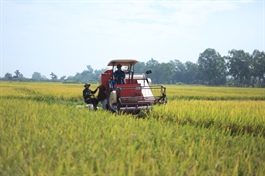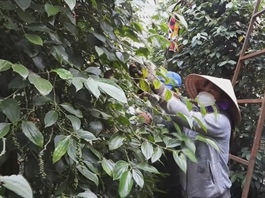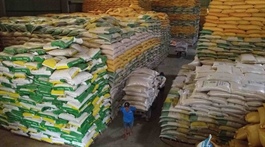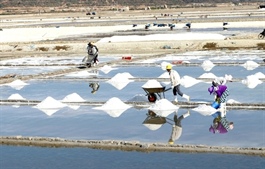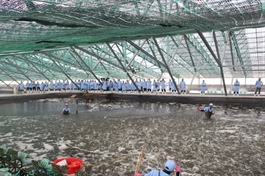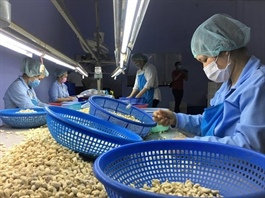Opportunities for Việt Nam to boost rice exports: official
Opportunities for Việt Nam to boost rice exports: official
Rice export curbs by some countries like India, Russia, and the United Arab Emirates (UAE) will offer opportunities to both Vietnamese exporters and farmers, the Ministry of Agriculture and Rural Development (MARD) said at a press conference in Hà Nội on Tuesday.
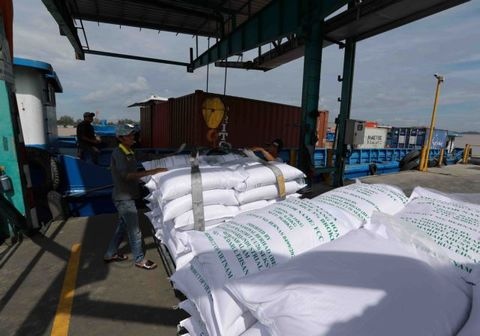
Loading export rice bags. Việt Nam shipped abroad 4.84 million tonnes of rice valued at US$2.58 billion in the first seven months of this year. — VNA/VNS Photo Vũ Sinh |
Deputy Minister of Agriculture and Rural Development Phùng Đức Tiến said the ministry proposed the Prime Minister issue a directive on enhancing rice exports in the present context, which should identify tasks of ministries, agencies, localities and businesses.
After the issuance, authorities will focus on removing obstacles to traders and farmers in order to optimise the opportunities to boost exports, he added.
The ministry reported that Việt Nam shipped abroad 4.84 million tonnes of rice valued at US$2.58 billion in the first seven months of this year, up 29.6 per cent from the corresponding time last year.
The national rice output is expected to reach from 43.2 to 43.4 million tonnes this year, up 1.8 to 2 per cent from 2022, the ministry said, noting that with the current production situation, the country is likely to meet domestic consumption and export from 7 to 7.5 million tonnes.
As of mid-July, localities had harvested over 24.1 million tonnes, up 0.4 per cent year-on-year, with rice prices in the Mekong Delta - the country’s rice bowl - increasing in the month.
Nguyễn Như Cương, Director of the MARD’s Department of Crop Production, said given hiking rice prices, the department has worked to raise the rice farming area for the autumn-winter crop in the Mekong Delta from 650,000ha to 700,000ha.
To reach the rice output target of 43 million tonnes, the department is coordinating with MARD's relevant agencies and localities in setting out cultivation plans and rolling out technical solutions, he said.
Cương also noted that El Nino could affect rice production, especially the winter-spring crop in the Mekong Delta, saying although its impacts in Việt Nam might be less severe than in other countries, vigilance should be maintained.
Regarding India’s ban on de-oiled rice bran exports, Deputy Director of the MARD’s Department of Livestock Production Phạm Kim Đăng told the press that Việt Nam’s demand for de-oiled rice bran is not big as the country uses about 4.7 million tonnes each year, but only 0.7 million tonnes is imported.
Rice bran can be replaced with wheat bran, he said, stressing that the ban is not a concern for the domestic husbandry sector.
Under the MARD’s rice export proposal to the Prime Minister, the ministry said it will supervise production in localities, instruct plant quarantine agencies to facilitate rice production and keep a close watch on market developments in order to achieve the target.
The ministry also suggested what should be done by other relevant ministries and agencies like the Ministry of Industry and Trade, and the Ministry of Foreign Affairs, and the People’s Committees of centrally-run cities and provinces.
Meanwhile, the Ministry of Industry and Trade (MoIT) on July 31 issued a dispatch to propose some tasks for the Việt Nam Food Association and businesses exporting rice to ensure the balance between export and domestic consumption and national food security goals, as well as contribute to stabilising domestic rice prices.
According to the dispatch, the traders of export rice strictly implemented the Government's regulations on trading export rice, and regularly maintain the minimum rice reserve level under Decree No 107/2018/NĐ-CP.
They need to report on the situation of paddy and rice reserve, signing of export contracts and performance of these rice export contracts.
The traders also need to monitor the performance of the global rice trade market, and inform the Việt Nam Food Association, MoIT and MARD on the situation relating to rice export activities in the domestic and international markets. Then, they proposed suitable solutions on promoting rice exports to relevant ministries and sectors.
According to MoIT, Minister of Industry and Trade Nguyễn Hồng Diên is expected to chair a conference relating to rice export management in Cần Thơ on August 4. The conference will discuss rice export solutions in the current difficult context.
Reuters reported that rice exporters in Thailand and Việt Nam are re-negotiating prices on sales contracts for around half a million metric tonnes of August shipments, two trade sources said, as India's ban has tightened global supplies.
Exporters are rushing to cover rice supplies from farmers who have raised prices following a surge in the world market, putting millions of dollars worth of deals at risk.
Rice farmers and exporters who had bought shipments in advance are set to gain from tightening world supplies, while buyers are likely to lose out despite making orders before India's announcement of the ban as sellers renegotiate contracts to get higher prices.
Rice importers have no choice but to pay higher rates as sellers will default on contracts, given the substantial increase in prices of the staple, traders said.







